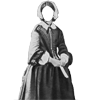Ada Lovelace Day: 8th October 2024
Oct. 8, 2024
Ada Lovelace Day celebrates the achievements of women in science, technology, engineering and maths (STEM). Held on the second Tuesday in October every year, this year it is celebrated on the 8th of October 2024.
Who was Ada Lovelace?
Ada Lovelace is considered by many to be the first ever person to write a computer program. She was born on 10th December 1815, long before computers were commonplace. She learned about computing when she made her own notes while translating a description of how the Analytical Engine, a primitive calculation machine, worked. Her notes were far more extensive than the description itself and she realised that its usage could go far beyond a simple calculation machine if it was inputted with the correct algorithms.
The importance of those notes wasn’t noticed during her lifetime. It wasn’t until the beginning of the digital age in 1953 that people started to realise how her ideas could be used. They gained so much recognition that by the late 1970s the United States Department of Defence named a programming language after her and now she is widely recognised as the first person to envision the true potential of the computer.
Ada Lovelace Day is a celebration, not only of her incredible achievements, but also the contribution that other women have made to the sciences in all fields.
Purple Mash resources

There’s plenty to explore in the Ada Lovelace Day area of Purple Mash.
Why not kick off with a slideshow about the life of the woman herself, highlighting her upbringing and how she came to be known as the first computer programmer? After that, children can reinforce their new found knowledge by creating an Ada Lovelace factfile before putting their learning to the test with the Ada Lovelace Day quiz. The quiz covers the achievement of a range of famous female scientists throughout history.
Women in Science
Speaking of famous women in science, there are several factfiles for children to complete in the Ada Lovelace Day area of Purple Mash. Their achievements span the sciences, from the radioactive research of Marie Curie and the prehistoric discoveries of Mary Anning to the astronomical work of Maggie Aderin-Pocock and trailblazing astronaut Helen Sharman.
There are also folders full of activities about both Florence Nightingale and Mary Seacole. In them you’ll find slideshows, quizzes, animations and a lot more.
Other activities and quizzes
The fun doesn’t stop there. You’ll find a collection of robot-based activities in the Ada Lovelace area too. Children can create their own robot and label its features, you could host a class debate about whether we should integrate robots into our society, or simply paint a robot.
Last, but definitely not least, come Mashcams. Give children the chance to become all kinds of characters from an android to an astronaut and Florence Nightingale herself.
Share with us
Whatever you do for Ada Lovelace Day, we’d love to see it. You can share your work with us on Twitter, Facebook or Instagram using the hashtag #ALD23
Useful links
Learn more from the Finding Ada Network





